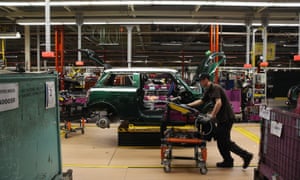Carmaker says Cowley closure minimises impact of supply disruption if there is no deal

BMW has said it will not build cars at its Mini plant immediately after the UK leaves the EU next year, to carry out annual maintenance.
Photograph: Oli Scarff/Getty Images
BMW plans to shut its Mini plant for a month after the UK’s official departure from the European Union, to minimise the impact of a no-deal Brexit that it fears would cause a shortage of parts.
The German carmaker said it was bringing forward annual maintenance work at the site in Cowley, Oxford – which turns out 1,000 Minis a day – to coincide with the weeks immediately following the UK’s exit from the EU.
The contingency plan is designed to limit any disruption to its production because any blockages in the cross-Channel supply of parts would occur while it is updating and replacing equipment, not while it is manufacturing cars.
BMW’s decision is the latest in a string of Brexit-related interventions by carmakers, which employ 186,000 people directly in the UK and tens of thousands more in the supply chain.
Ealier on Tuesday, Honda said a no-deal Brexit would cost it “tens of millions”, while Jaguar Land Rover has moved 2,000 staff at its Castle Bromwich plant to a three-day week until Christmas, citing Brexit uncertainty and sliding sales of diesel-powered cars.
“Planned annual maintenance periods at BMW Group production sites allow essential updating and equipment replacement to be completed over several weeks, while there is no production taking place.
“As a responsible organisation, we have scheduled next year’s annual maintenance period at Mini Plant Oxford to start on 1 April, when the UK exits the EU, to minimise the risk of any possible short-term parts supply disruption in the event of a no-deal Brexit.
“While we believe this worst-case scenario is an unlikely outcome, we have to plan for it.
“We remain committed to our operations in Britain, which is the only country in the world where we manufacture for all three of our automotive brands.”
Several Brexiters, including former Brexit minister David Davis, have claimed that carmakers such as BMW would lobby the German chancellor, Angela Merkel, to ensure the EU agreed to a deal that suits Britain.
In February 2016, Davis said: “Within minutes of a vote for Brexit the CEOs of Mercedes, BMW, VW and Audi will be knocking down Chancellor Merkel’s door demanding that there be no barriers to German access to the British market.”
But BMW and other automotive firms have been among the most vocal sectors in British industry about the pitfalls of a no-deal Brexit, underlining the risk posed by any customs delays to the “just in time” production techniques used by carmakers.
BMW warned earlier this year that it could be forced to shut some of its four UK plants, putting 8,000 jobs at risk, if parts for the Minis and Rolls-Royces it makes in Britain are caught up in customs delays.
Honda said earlier on Tuesday that a no-deal Brexit would cost it tens of millions of pounds in additional tariffs and would damage its competitiveness.
Like BMW, the Japanese carmaker said it was committed to its UK factory, in Swindon.
The chief executive of the automotive trade body, the Society of Motor Manufacturers and Traders, warned this year that auto firms were not ready for this scenario, with the official exit date of 29 March 2019 looming.
Asked if there were any potential Brexit benefits for the British automotive industry, which has a combined annual turnover of £82bn, Mike Hawes said: “Not that we can see.”